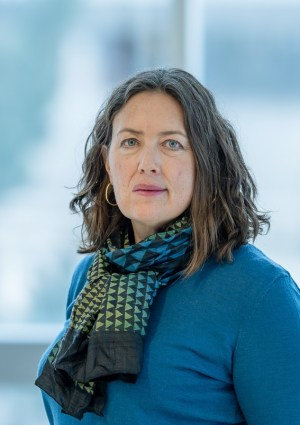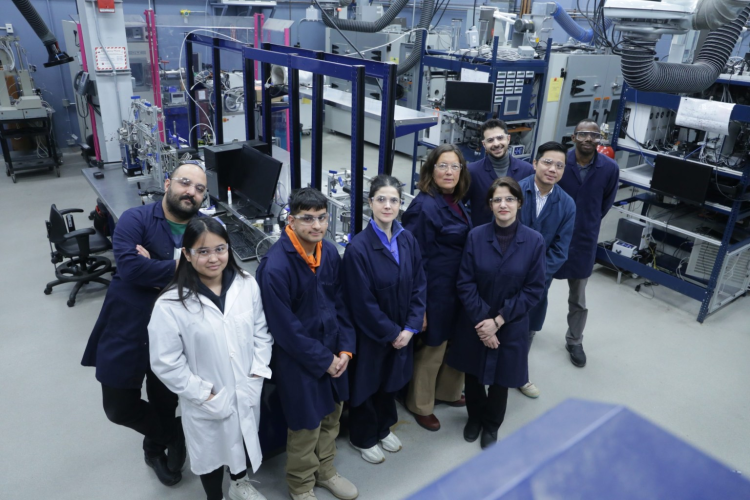Dr. Lesley James says Memorial University researchers are playing a vital role in mitigating climate change and creating a cleaner energy future.
The professor in the Department of Process Engineering, Faculty of Engineering and Applied Science, is part of a team that wants to better understand and maximize the carbon storage potential of the province's offshore.
Memorial is partnering with the Hibernia and Hebron projects on the joint project, which recently received a $3-million investment from the provincial government.
The project is the first one approved under the province's $6-million Carbon Capture, Utilization and Storage (CCUS) Innovation Challenge, which was launched in October 2023.
'Educate the next generation'

Dr. Lesley James. Photo: Rich Blenkinsopp
Dr. James is looking forward to the work.
"I am grateful to the Government of Newfoundland and Labrador, the Hibernia and Hebron projects and Memorial University for the opportunity to work on a complex challenge for a globally cleaner future," she said. "Energy is neither created nor destroyed; as a teacher and researcher, my energy helps educate the next generation who, in turn, will help create a new energy industry right here and around the world."
From Memorial, the research team also includes Dr. Syed Imtiaz, professor and head of the Department of Process Engineering, in the faculty.
World-class capabilities
The project focuses on building Memorial University's capacity and capability in geological carbon storage within the province.
It will enhance laboratory facilities, increase competencies in laboratory methods and develop outreach capabilities through external engagement and collaboration with industry subject matter experts.
The collaboration is expected to enable world-class research capabilities in this field.
The two-year project, titled Enabling CO2 Subsurface Storage Evaluation Capacity and Capabilities, will support foundational laboratory and research capabilities for Memorial University to assess carbon dioxide subsurface storage valuation capacity and capabilities.
Currently, there is no post-secondary institution in the province able to conduct such research.
"When government, industry and academia work collaboratively to find innovative solutions to global issues, everyone wins." Dr. Tana Allen
The project will assist with the development of highly qualified personnel in the emerging technologies and skills associated with carbon capture and storage.
Funding for the project will be provided by the Innovation and Business Investment Corporation.
The challenge requires applications to be submitted jointly by one lead industry and one lead academic partner.
In addition to provincial government funding, Memorial University will leverage an additional $6,786,614 from the Hibernia and Hebron projects with project delivery support from Energy Research and Innovation Newfoundland and Labrador.

Research team members from left are Maziyar Mahmoodi, Marge Gutierrez, Javieer Singh Matta, Sepideh Alimohammadi, Dr. Lesley James, Hamidreza Shiri, Mahsan Basafa, Ngo Thanh Vuong and Lucky Abiashue. Missing: Khashayar Ahmadi, Dorcas Akrong, Ejiro Ovwigho, Norah Hyndman, Fatemeh Reisi and Farzan Sahari Moghaddam. Photo: Submitted
Steve Crocker, minister of Industry, Energy and Technology, says carbon capture, utilization and storage holds "great potential" for the province's highly skilled offshore workforce and businesses.
"By establishing a world-class laboratory at Memorial University, we are helping to ensure that future researchers and leaders in CCUS will be trained here in our province," he said. "I also want to thank the Hibernia and Hebron projects for their significant contributions that will help to make this new laboratory possible."
Benefits of the project include increased laboratory facilities to evaluate and characterize carbon dioxide subsurface storage by purchasing equipment and establishing new lab facilities in Memorial's Bruneau Centre for Research and Innovation to enable carbon capture, utilization and storage-specific experimentation, as well as support the analysis of data to further characterize the potential storage capacity of the province's offshore; increased capacity and capabilities in laboratory methods through exchange of information, training and laboratory best practices between academic and industry subject matter experts, which will significantly increase Memorial University's capacity for carbon capture, utilization and storage research; and achieving world-class scCO2 SCAL (supercritical CO2, specialized core analysis laboratory) standards by working with global industry subject matter experts.
Green economy transition
"Congratulations to Memorial University and ExxonMobil for being the first project funded under the Carbon Capture, Utilization and Storage Innovation Challenge," said Lisa Dempster, minister, Environment and Climate Change. "Carbon capture, utilization and storage is essential to mitigating climate change and achieving our net zero goals. This impactful initiative will help to reduce greenhouse gas emissions, promote clean innovation and growth and support the transition to a green economy."
Offshore carbon capture, utilization and storage can potentially play a key role in helping Newfoundland and Labrador achieve its greenhouse gas reduction targets.
The province's offshore storage capacity could also help other jurisdictions meet their own emissions reduction targets.
Dr. Tana Allen, vice-president (research), at Memorial congratulates everyone involved in the project.
"When government, industry and academia work collaboratively to find innovative solutions to global issues, everyone wins. As a leader in energy-related research, Memorial University is excited to expand our capacity and achieve bold, new discoveries. Thank you to our government and industry partners for continuing to support our experts and their leading-edge research."
Learn more about research at Memorial and check out Research Strategy 2023-28 to learn how we're moving ideas forward.













